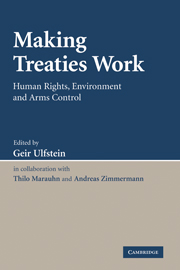Book contents
- Frontmatter
- Contents
- Preface and acknowledgments
- Notes on the contributors
- Table of cases
- Table of treaties and other international instruments
- INTRODUCTION
- PART I INTERNATIONAL HUMAN RIGHTS
- PART II INTERNATIONAL ENVIRONMENTAL LAW
- PART III INTERNATIONAL ARMS CONTROL
- GENERAL COMMENTS
- 14 Dispute resolution
- 15 Compilance control
- 16 Enforcement
- Index
15 - Compilance control
Published online by Cambridge University Press: 05 September 2009
- Frontmatter
- Contents
- Preface and acknowledgments
- Notes on the contributors
- Table of cases
- Table of treaties and other international instruments
- INTRODUCTION
- PART I INTERNATIONAL HUMAN RIGHTS
- PART II INTERNATIONAL ENVIRONMENTAL LAW
- PART III INTERNATIONAL ARMS CONTROL
- GENERAL COMMENTS
- 14 Dispute resolution
- 15 Compilance control
- 16 Enforcement
- Index
Summary
In their highly influential 1995 book on The New Sovereignty, Abram Chayes and Antonia Handler Chayes argue for a ‘co-operative, problem-solving approach’ to compliance with international regulatory agreements. Drawing upon examples from the areas of human rights, environmental protection and arms control, Chayes and Chayes assert that States generally enter into commitments with an intention to comply and that non-compliance more often results from norm ambiguities or capacity limitations than from deliberate disregard. Therefore, apart from the fact that ‘sanctioning authority is rarely granted by treaty, rarely used when granted’, sanctions are ‘likely to be ineffective when used’. Compliance strategies should focus instead on the actual causes of non-compliance and ‘manage’ these through positive means, consisting in a blend of transparency (regarding both the regime's requirements and procedures and the parties’ performance), dispute settlement and capacity-building. The main engine of this ‘managerial’ approach is continuous processes of argument and persuasion, ‘justificatory discourse’ that ultimately ‘jawbones’ States into compliance.
As it turns out, the active treaty management that Chayes and Chayes advocate has indeed established itself as central to compliance strategies in the three areas. While there is considerable variation in the precise configuration of compliance control approaches, strong managerial elements can be found in the practice of virtually all the treaties examined in this book.
- Type
- Chapter
- Information
- Making Treaties WorkHuman Rights, Environment and Arms Control, pp. 373 - 390Publisher: Cambridge University PressPrint publication year: 2007
- 3
- Cited by



